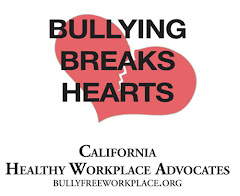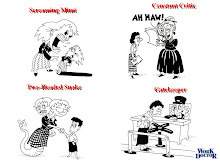When push comes to shove, workplace bullies are costing the company money. And that's a good focus when dealing with them.
As a species, it seems we're doomed to interact with jerks.
It happens in high school, and we think, "Once I get to college, things will be different."
Then it happens in college, and we think, "Once I get a job, people there will be more mature."
Not so much. Jerks abound, and, as fate would have it, the workplace is as much a breeding ground for bullies as the playground.
While much has been done in recent years to address bullies in the schoolyard, the issue of bullying at work remains largely under the radar. In fact, because of a work culture that often rewards aggressiveness, bullies have a nasty tendency of succeeding at work.
"This is one of the great undiscussables in the American workplace because it seems if you haven't experienced it, you're likely to believe it doesn't happen," said Gary Namie, a social psychologist and co-founder of the Workplace Bullying Institute. "What we're seeing is a lot of abusive conduct, but it's accepted as routine in the American workplace."
Last year, Namie commissioned the polling group Zogby International to survey U.S. workers. The research found that 35 percent of the country's workforce has experienced bullying on the job, and another 15 percent has seen it happen.
The remaining 50 percent of respondents had neither seen nor experienced bullying, a statistic that Namie said makes it hard for some to relate to the problem. He calls it a "silent epidemic."
"So often in the workplace the feeling is, 'Hey, you're an adult, handle it yourself,'" Namie said. "They sometimes even blame the victim. But you know what? We said that for domestic violence for a long, long time until they criminalized it. So people need to stop the silly rationalizations."
To be clear, "workplace bullying" doesn't apply to acts of violence.
"What separates bullying from workplace violence or harassment is the fact that the bullying is something that's done on a continuous basis," said Timothy Dimoff, founder of SACS Consulting & Investigative Services, an Ohio-based company that specializes in high-risk workplace and human resource issues. "It's constant and repetitive; someone who's using different means of harassment, whether it's complaining about the person, spreading rumors, blaming them, encouraging others not to talk to the person. It's more psychological and emotional abuse."
Think about your workplace, and there's a good chance you've seen this or dealt with it. In the most severe cases, a manager tries to sabotage an employee by taking credit for work or writing a negative performance review. More routinely, a co-worker or manager picks away at an employee, making cracks about them in front of other people, demeaning them even in subtle ways.
This behavior may seem routine in a world of snarkiness, but when it happens day in and day out, and when the targeted person feels unable to fix the situation, it can lead to serious physical and mental health problems. Consider how difficult it might be, particularly in this job market, for a victim to protest the way a manager is treating them.
"Many people nowadays feel really locked in," Namie said. "Like there's no escape route, and that just makes the situation worse."
The fact is, some folks will find themselves in situations where the only way out is to quit. That's obviously a worst-case scenario, but if a bully is making your life so miserable it's affecting you physically and mentally, you've got to cut ties and take care of yourself.
Before that, however, there are steps you can take to try to put the bully in his or her place.
"They need to take it to their human resources person or their immediate supervisor," Dimoff said. "If they don't get any results, then they need to go to somebody higher. In the meantime, they need to document when these things happen, where they happen and what was said and done. If they don't write it down, it's hard to remember details, and things get distorted. When management sees an employee come in with this in writing, they react much more quickly and thoroughly to it."
Namie suggests that the target look for ways to quantify the harm a bully is causing a company. How many people has the person driven away? How much work time is eaten up contending with problems relating to the bully?
"You want to be able to tell the executives that the bully is too expensive to keep; actually present the business argument that the bully is too expensive," Namie said. "What can discredit the person who is the target is emotionality. The emotionality is scary to management. So you make a dispassionate argument."
Of course, management is, or should be, responsible for creating an environment that repels bullies.
"The company needs to have policies and procedures against bullying and workplace violence, and they need to let those procedures be very well known to their management and employees," Dimoff said. "Companies need to work on creating a more positive culture. In positive cultures, we don't see the bullying. People work together and don't resort to negative tools."
Namie's Workplace Bullying Institute is pushing a Healthy Workplace Bill, which is being considered in 11 states, that would crack down on office bullies and clearly define what it means to have an "abusive work environment." You can learn more about the bill at healthyworkplacebIll.org.
A final point: If you think a bullying co-worker is trying to make you a target, be proactive.
Bullies, at the end of the day, are cowards. They feed off people who put up with their abuse. So the moment someone begins to pick at you, stand up to them. Let them know you won't tolerate improper treatment.
The alternative is to let it go, and that's almost guaranteed to not end well.
Talk to Rex: Ask workplace questions—anonymously or by name—and share stories with Rex Huppke at IJustWorkHere@tribune.com, like him on Facebook at facebook.com/rexworkshere and find more at chicagotribune.com/ijustworkhere.



























No comments:
Post a Comment